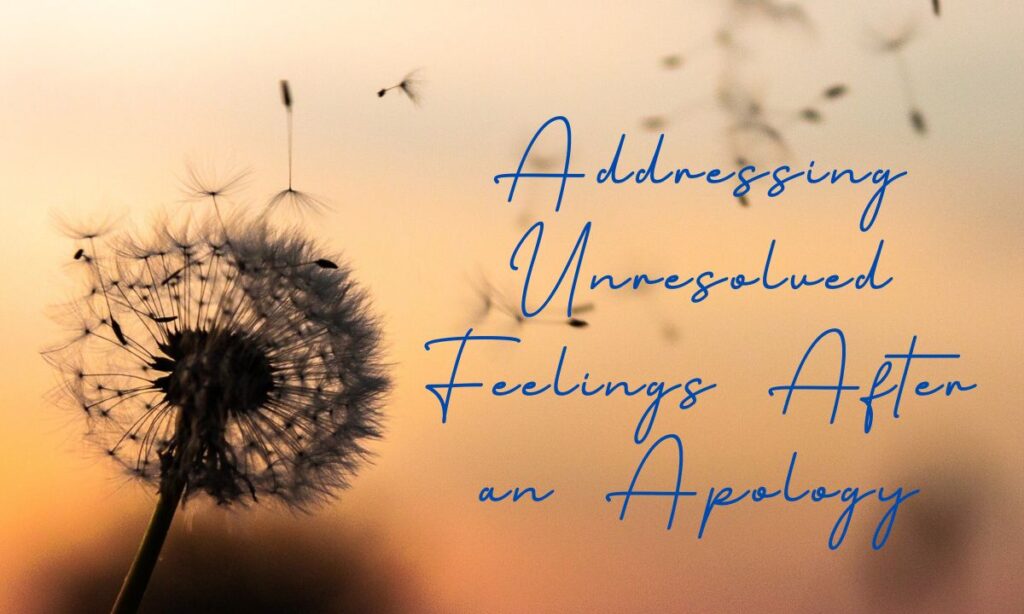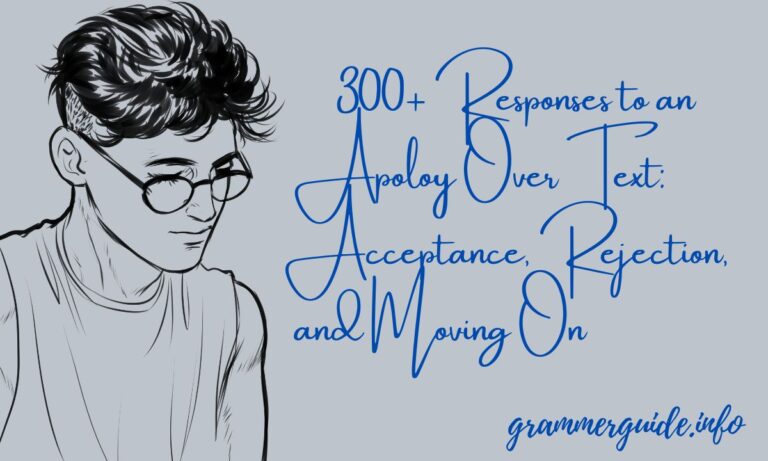Receiving an apology via text can be both a relief and a challenge. How you respond to someone’s “I’m sorry” can either heal your relationship or create more distance.
The digital nature of text messages removes facial expressions and tone, making your word choice especially important.
Finding the right balance between honesty and compassion requires thoughtfulness, whether you’re ready to forgive or need more time to process your feelings.
Understanding the Apology Received
When you receive an apology, it’s essential to assess its sincerity. Look for clear acknowledgment of the wrongdoing and an expression of genuine regret.
Consider whether the person is taking responsibility for their actions without deflecting blame. This helps you decide how to respond thoughtfully.

Effective Ways to Accept an Apology via Text
- Thank you for your apology.
- I appreciate you taking responsibility.
- Let’s put this behind us.
- Everyone makes mistakes.
- I value our relationship more than this disagreement.
- Your apology means a lot to me.
- I understand you didn’t mean to hurt me.
- Consider us good again.
- I forgive you completely.
- Let’s move forward from here.
- No worries, we’re still friends.
- I’m glad we could resolve this.
Accepting an apology gracefully can strengthen your relationship. It shows maturity and willingness to prioritize connection over conflict.
Crafting Rejection Responses to Text Apologies
- I need more time to process this.
- Your apology doesn’t address what actually happened.
- I don’t feel you understand why I’m hurt.
- This needs a conversation, not just a text.
- What you did requires more than words to fix.
- I appreciate you reaching out but I’m not ready to move past this.
- Your actions and words don’t align.
- I need space right now.
- This apology feels rushed.
- Please respect my feelings on this matter.
- We need to discuss this further.
- This issue requires more than a simple apology.
Rejecting an apology doesn’t mean holding a grudge. It means acknowledging that some situations require more work to repair trust.
Perfect Apology
A perfect apology acknowledges specific actions without excuses. It demonstrates genuine remorse through clear language and offers concrete steps to make amends. The apologizer takes full responsibility without minimizing the impact of their behavior.
The best apologies address what went wrong and include a plan for change. They respect the recipient’s feelings without demanding immediate forgiveness and leave space for the other person to express their thoughts about the situation.
Short and Sincere Replies to Apology Texts
- Thank you for saying that.
- I accept your apology.
- Let’s start fresh.
- Apology accepted.
- I appreciate your honesty.
- That means a lot.
- We’re good.
- No hard feelings.
- Thanks for reaching out.
- Water under the bridge now.
- Consider it forgotten.
- I’m ready to move forward.
Responding concisely can be powerful when the situation doesn’t require extensive discussion. Brief responses work best for minor issues.
Understanding When Not to Accept an Apology
- The same behavior keeps happening repeatedly.
- The apology blames you for their actions.
- You feel pressured to forgive quickly.
- The person demands forgiveness.
- The apology lacks sincerity.
- Trust has been broken too severely.
- Your personal boundaries were violated.
- The apology contains no accountability.
- You need more time to process your feelings.
- The situation caused significant harm.
- The apology feels manipulative.
- Your instincts tell you not to accept it.
Not every apology deserves acceptance. Protecting your emotional wellbeing sometimes means refusing hollow words.
Examples of Moving On After an Apology
- What time works for lunch next week?
- Did you see that movie we talked about?
- I’m looking forward to our next project together.
- Let’s plan something fun soon.
- How has your week been going?
- Should we try that new restaurant?
- The weather looks perfect for our plans.
- Have you heard from the team lately?
- What did you think about the meeting?
- I found an article you might enjoy.
- Are we still on for Saturday?
- Can you send me those files when you get a chance?
Moving conversations toward normal topics helps reestablish comfortable communication. Natural transitions signal willingness to rebuild connection.
How to Respond to Insincere Apologies Over Text
- Your words and actions don’t match.
- This seems like you’re just going through motions.
- I need you to understand why this hurt me.
- A real apology requires understanding what went wrong.
- Please reflect more on what happened.
- This feels like an excuse, not an apology.
- I deserve a genuine response.
- Let’s talk when you’re ready to be sincere.
- This isn’t addressing the real issue.
- I can’t accept an apology that deflects responsibility.
- Please try again when you mean it.
- Words without changed behavior don’t count.
Recognizing insincerity prevents repeated hurt. Addressing fake apologies establishes standards for respectful communication.
Tips for Maintaining Boundaries After an Apology
- I accept your apology but need some space.
- Let’s take things slowly moving forward.
- I need to see consistent change before fully trusting again.
- Please respect my decision about this.
- Going forward, please don’t repeat this behavior.
- I’ve forgiven you but won’t forget the lesson.
- Let’s establish clearer expectations now.
- I need you to honor my limitations.
- This is my line in the sand.
- My forgiveness doesn’t mean instant trust.
- I need to see actions, not just words.
- Let’s agree on how to prevent this happening again.
Setting healthy boundaries after conflict protects relationships. Clear expectations help prevent future misunderstandings.
Expressing Forgiveness Through Text Messages
- I forgive you completely.
- Let’s leave this in the past.
- Your apology means everything to me.
- We all make mistakes.
- I understand and forgive you.
- This doesn’t define our relationship.
- I appreciate your courage in apologizing.
- Everyone deserves a second chance.
- I value you more than this mistake.
- This won’t come between us.
- Your words heal the hurt.
- Thank you for caring enough to make things right.
True forgiveness isn’t just about the words but the feeling behind them. When you forgive via text, ensure your message conveys genuine release rather than lingering resentment.
Addressing Unresolved Feelings After an Apology
- I’m still processing my feelings.
- Your apology helps but I need time.
- I accept your words but still feel hurt.
- This is a step in the right direction.
- I appreciate your apology but need space.
- Some wounds take longer to heal.
- I’m working through mixed emotions.
- Your apology matters even though I’m still upset.
- Let’s talk more when I feel calmer.
- I recognize your effort to make amends.
- My feelings are complicated right now.
- I want to move past this but need time.
Acknowledging remaining emotions shows honesty and self-awareness. Being transparent about unresolved feelings prevents future misunderstandings while allowing healing to occur naturally.
Read Also:300+ Best Responses to Condolence Messages with Gratitude & Comfort

Guidelines for Responding to Late Apologies
- Better late than never.
- I’ve been waiting for this.
- The timing matters less than the sincerity.
- I wondered if you’d ever apologize.
- This helps close a chapter for me.
- I appreciate you finally addressing this.
- Late recognition is still valuable.
- This brings unexpected closure.
- I’d given up expecting an apology.
- Your words still matter after all this time.
- The past can still be healed.
- Thank you for finally acknowledging what happened.
Late apologies can reopen old wounds but also provide unexpected healing. Consider whether the delayed recognition brings value or simply disrupts your peace before deciding how to respond.
Navigating Complex Apology Situations via Text
- We need to talk about this in person.
- This requires a deeper conversation.
- Text limits what we can resolve here.
- Let’s schedule time to discuss this fully.
- Some parts of this need clarification.
- I appreciate your text but prefer talking.
- This situation has many layers.
- Can we continue this conversation face-to-face?
- Your apology raises important questions.
- This deserves more than text messages.
- Let’s address the underlying issues together.
- I need to hear your voice for this conversation.
Complex situations rarely resolve neatly through text exchanges alone. Recognizing when to transition to richer communication channels shows emotional intelligence and commitment to true resolution.
Balancing Honesty and Compassion in Text Replies
- I hear you and honor my own feelings too.
- Your apology matters and so does my truth.
- I appreciate your words while protecting my peace.
- Thank you for apologizing; I’m being careful with my heart.
- I value your effort and my own boundaries.
- Your regret seems sincere and my healing is important.
- I acknowledge your apology without dismissing my experience.
- This helps but doesn’t erase what happened.
- I’m balancing forgiveness with self-respect.
- Your words matter and so does my process.
- I recognize your remorse while honoring my journey.
- Thank you; I’m working on finding middle ground.
Kind responses don’t require sacrificing your truth or boundaries. Finding the balance between acknowledging someone’s apology and protecting your emotional wellbeing creates healthier relationships.
Recognizing Genuine Apologies in Digital Communication
- Your words show real understanding.
- This apology addresses the actual issue.
- I can feel the sincerity in your message.
- You clearly understand why I was hurt.
- Your apology takes responsibility without excuses.
- This feels like a turning point.
- You’ve acknowledged exactly what went wrong.
- Your message shows genuine reflection.
- This apology feels different from past ones.
- I appreciate the thought behind these words.
- Your text shows you really get it.
- This feels like an honest recognition of what happened.
Authentic apologies stand out through specificity and emotional intelligence. Learning to distinguish genuine remorse from empty words protects you from repeated cycles of hurt.
Setting the Tone for Future Interactions Post-Apology
- Let’s move forward with clearer communication.
- I’d like us to be more honest going forward.
- This gives us a fresh start.
- Let’s use this as a learning opportunity.
- I hope we can build something better now.
- This could strengthen our relationship.
- Let’s be more mindful of each other’s feelings.
- Moving forward requires consistent effort.
- I believe we can do better together.
- Let’s check in more often about our feelings.
- This can be the beginning of something stronger.
- I’m hopeful about our future interactions.
How you close the apology conversation establishes expectations moving forward. Setting a constructive tone helps transform conflict into an opportunity for relationship growth.
Deciding Whether to Reconcile After an Apology
- I need to see changed behavior first.
- Let’s take small steps toward rebuilding trust.
- I’m open to reconciliation with clear boundaries.
- This apology is just the beginning of repair.
- I need time to decide about our relationship.
- Let’s see if actions match these words.
- Reconciliation depends on consistent change.
- I’m cautiously optimistic about moving forward.
- This apology doesn’t guarantee reconnection.
- We need to rebuild slowly and intentionally.
- I’m considering what’s best for my wellbeing.
- Forgiveness doesn’t automatically mean reconciliation.
Forgiveness and reconciliation are separate decisions. Thoughtfully considering whether to rebuild a relationship protects your emotional health while allowing for genuine transformation.
FAQ’s
What makes an apology text message seem sincere?
A sincere apology acknowledges specific actions, takes responsibility without excuses, and offers concrete steps to make amends.
How long should I wait before responding to an apology text?
Take as much time as you need to process your emotions, from a few minutes to a few days, depending on the severity of the situation.
Should I always accept someone’s apology?
No, acceptance should depend on the sincerity of the apology, the nature of the offense, and your own emotional readiness to forgive.
Is it better to respond to serious apologies in person instead of text?
Yes, complex or serious situations often benefit from face-to-face conversation where tone and body language can prevent misunderstandings.
How can I tell if someone is apologizing just to end the conflict?
Look for vague language, lack of specific acknowledgment, blame-shifting phrases, or pressure for immediate forgiveness.
Conclusion
How we respond to apologies reflects our boundaries, values, and capacity for forgiveness. The perfect response balances acknowledging the other person’s effort while honoring your own feelings.
Whether you choose to accept, reject, or ask for more time, your response should align with your authentic emotions rather than social pressure.
Remember that genuine healing takes time, and sometimes the wisest response is simply acknowledging receipt while giving yourself space to decide what comes next.

I’m Hayyat, a passionate content writer and SEO expert with 5 years of experience. I specialize in creating engaging content and optimizing it for search engines.






1 thought on “300+ Responses to an Apology Over Text: Acceptance, Rejection, and Moving On”